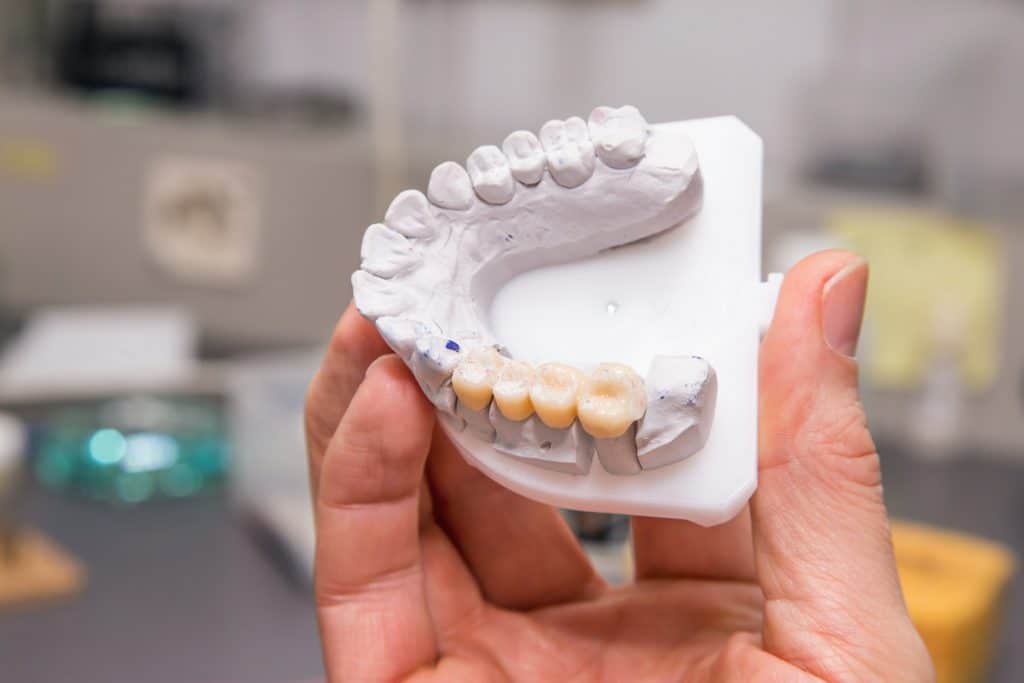DENTAL CROWNS

As part of our comprehensive range of restorative dentistry services, The Art of Dentistry offers Dental Crowns to our patients in Toronto and surrounding communities. Dental crowns are custom-made dental prostheses designed to replace missing teeth and restore damaged teeth. Dr. Sol Weiss works with master ceramists to ensure our crowns not only fit well, but look completely natural. If you are suffering with a missing tooth, or a tooth that has been damaged by trauma or decay, crowns can restore your smile. Learn more by scheduling an appointment with us today.
Crowns Restore Damaged Teeth
- Restore a tooth that has undergone root canal therapy
- Protect a tooth that has had a large portion removed because of decay
- Strengthen a fractured or cracked tooth

Other Restorative Applications
Dental crowns can be used to support dental bridges. Bridges are partial dentures designed to replace missing teeth, and can connect to a pair of adjacent crowns. Dental crowns can also be used to restore Dental Implants. Dental implants are titanium posts surgically implanted in the jaw bone to replace missing tooth roots. A dental crown attaches to the implant, providing a full restoration. Implants provide a level of support that allows you to use your restorations to chew and speak with the same level of confidence you experienced with your natural teeth.
Cosmetic Applications
- Concealing stubborn intrinsic discoloration, which is resistant to bleaching
- Restoring teeth that are smaller than surrounding teeth
- Concealing misshapen teeth with a more attractive restoration
Learn More About Dental Crowns
Frequently Asked Questions
Is a dental crown a permanent solution?
A dental crown is a long-term solution, but it may not be considered a permanent solution. On average, dental crowns can last between 10 to 15 years or even longer with proper care and maintenance. However, the lifespan of a dental crown can vary depending on various factors, such as oral hygiene practices, habits like teeth grinding or clenching, the location of the crown in the mouth, and general wear and tear.
Over time, a dental crown may experience normal wear, and the underlying tooth structure may undergo changes. This can result in the need for replacement or repair of the crown. Additionally, dental crowns can be subject to damage due to trauma, decay around the crown margins, or loosening of the cement or bonding material holding the crown in place.
Regular dental check-ups are essential to monitor the condition of your dental crown and identify any signs of deterioration or issues early on. Your dentist will assess the integrity of the crown, check for any signs of decay, and ensure that it is still functioning properly.
If a dental crown becomes damaged, loose, or fails, it can often be repaired or replaced. Your dentist will evaluate the specific situation and recommend the most appropriate course of action.
Will I need a temporary crown while waiting for my permanent crown?
In many cases, a temporary crown is necessary while waiting for the fabrication of a permanent crown. The temporary crown serves as a temporary restoration to protect the prepared tooth and provide functionality and aesthetics until the permanent crown is ready.
Here are some reasons why a temporary crown may be required:
protection, tooth sensitivity, aesthetics, and functionality.
The process of receiving a temporary crown involves taking an impression of the prepared tooth and fabricating the temporary crown in the dental office or a dental laboratory. The temporary crown is then placed over the prepared tooth using a temporary cement that allows for easy removal when the permanent crown is ready.
It’s essential to follow any instructions provided by your dentist regarding the care and maintenance of the temporary crown. This includes avoiding sticky or hard foods that can dislodge or damage the temporary crown. It’s also important to maintain regular oral hygiene practices, gently brushing and flossing around the temporary crown.
Can a dental crown help protect a weak or damaged tooth?
Yes, a dental crown can help protect a weak or damaged tooth. When a tooth is weakened or has suffered significant structural damage, a dental crown can provide strength, support, and protection to restore its functionality and appearance.
Here are some ways a dental crown can help protect a weak or damaged tooth: structural reinforcement, reservation of tooth structure, protection against decay: restoring functionality, and aesthetics.
Your dentist will evaluate the extent of the tooth damage and determine if a dental crown is the appropriate treatment option. They will consider factors such as the remaining tooth structure, the location of the tooth in the mouth, and your overall oral health.
What is the expected lifespan of a dental crown?
The expected lifespan of a dental crown can vary depending on several factors, including the type of crown, the materials used, oral hygiene practices, habits like teeth grinding or clenching, and general wear and tear. On average, dental crowns can last between 10 to 15 years or even longer with proper care and maintenance.
Consult with your dentist for personalized advice regarding the expected lifespan of your specific dental crown. They will consider the specific factors applicable to your case and provide guidance on care, maintenance, and potential treatment options.
